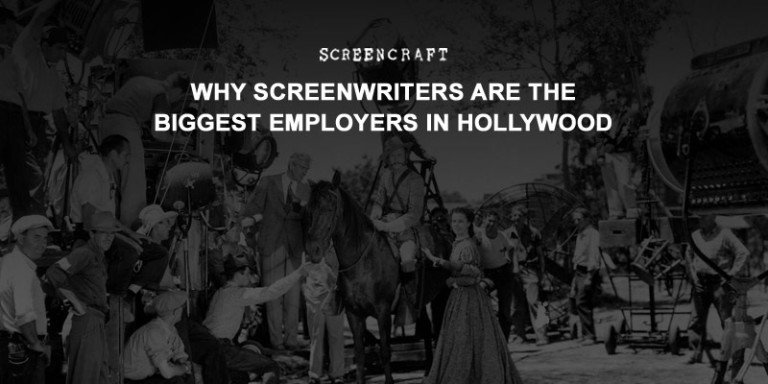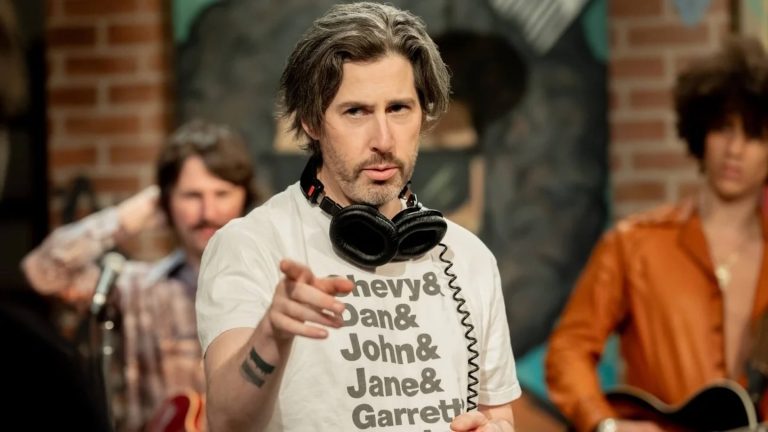Why Screenwriters Are the Biggest Employers in Hollywood

We've all heard — and some of us have experienced firsthand — that screenwriters are perhaps the most undervalued individuals in Hollywood. When a film wins Best Picture or makes a billion dollars at the box office, whose name do we hear? The star, the director, and maybe some of the high-profile producers. A majority of the time, however, the screenwriter is somewhat anonymous amidst any of the hoopla.
This is likely due to the fact that film is a collaborative art form and business, and it all only starts with the written word.
It all gets interesting when you look at it from a different perspective. There's a truth that isn't often spoken out loud in Hollywood, or the world, as a whole. And it's a truth that our friend, screenwriter Jim Hart (Bram Stoker's Dracula, Hook, Contact), wrote about in this eye-opening post we found on The Hill.
But let's first point out what it's like being a screenwriter.
It's hard. It's a grind. Screenwriters struggle for the few coveted assignments. They struggle to even be in contention in the first place. They struggle to just get their scripts read so they can attain representation, which is necessary to introduce them and their writing to the powers that be in Hollywood. They are often replaced without warning or care. They are paid a fraction of what eventual directors, talent, and producers make for any given film. And yes, they also receive a fraction of the kudos when a film does well.
Jim Hart, however, recently pointed out something amazingly true — screenwriters are the biggest employers in Hollywood and beyond. A notion that has been staring us right in the face.
In the post, Jim wisely stated the obvious:
"Let me say that with conviction. I am a job creator. Thousands and thousands of jobs are created by me and my screenwriting colleagues — every single year without fail. Thousands. And it does not require a vote of Congress, or a filibuster, or a threat of government shutdown, or actually living up to and delivering on a campaign promise made in the heat of passion in order to get votes."
He goes on to say:
"When a writer types THE END, it is the beginning of a process that involves hundreds of jobs and services before the script even reaches the actual production stage. Staff at the Producer’s office, Studio execs, and Story execs and their staff who are employed to read, develop, finance and produce your script get to keep their jobs because of writers. Agents, Managers, Lawyers who negotiate the writer deals, all have jobs in part because of writers. Once the script goes into the production stage, the amount of jobs required to produce a film grows exponentially; crews of 100-400 and more become necessary; local vendors and merchants in the location where my script is being filmed benefit and are able to boost employment. Hotels, car rental agencies, airlines, local restaurants, stores, shops, all benefit enormously by my typing THE END.
My two screenplays of Hook and Bram Stoker’s Dracula occupied every soundstage at Sony Studios and Culver Studios, employed hundreds of crew and crafts persons, hundreds of extras and lots of pirates, lost boys, vampires, and one faerie for two years non-stop. Over the past 20 years, both films have generated $500 million in revenues to the studio, which translates into a billion dollars in worldwide revenues. And it all started with this writer and a cursed imagination finding a way to type THE END."
Jim was given such words of wisdom while he was admittedly struggling internally, as many screenwriters do, while working with two legendary icons. Jim states:
"The late great Frank Pierson who wrote such brilliant screenplays as Cool Hand Luke and Dog Day Afternoon explained this alchemy to me over a couple of single malts at the Hole in the Wall bar at Sundance in 1994. I was in the process of having two of my scripts made by two of the most legendary directors of all time and I was not handling it well.
Frank said in that distinct shrill drill sergeant voice of his; 'When you're in the dumps at the end of your rope ready to throw yourself off a cliff because you’re convinced no one gives a shit about your stories, just remember that no director, including those two legends, no actor, no cinematographer, no set designer, costume designer, sound mixer, no SFX guys, no editor, no caterer, no driver, nobody, nobody has a job until you type THE END.'"
Jim went on to say that the proudest he's been as a screenwriter receiving a credit on a film was for the recent Epic, which at the end of the credits listed — as many films do now — the fact that “The making and authorized distribution of this film supported more than 12,000 jobs and involved over one million work hours.”
This end credit is listed by many studios these days to point out the fact that so many lives and jobs are affected by piracy — which Jim Hart was also writing about in the article — but it also states the importance of the screenwriter in Hollywood. It showcases the fact that despite how lowly screenwriters are looked upon and treated, screenwriters need to lift their heads up and realize how much of an impact they truly make. And yes, in turn, so should the powers that be in Hollywood.
While film is a collaborative effort and there are hundreds, and even thousands, that take part after the script is handed in, the truth is that it begins with the word. It begins with that seed of a concept or idea in the screenwriter's mind. And if they don't originate the concept or idea, it begins when they are handed over the responsibility of seeing that concept or idea through. It begins when their mind begins to wander and their fingers begin to move over those keys. It begins when they piece together the stories and character arcs, the action set pieces, the drama, the laughs, thrills and suspense.
Hollywood studios thrive on cultivating movies. The corporations that own them thrive on what they produce, as do the shareholders. And the jobs trickle down as executives, assistants, office managers, consultants, cooks, janitorial staff, security guards, accountants, marketing staff, producers, directors, hundreds of crew members, drivers, lead and supporting actors, managers, agents, and movie extras — to name just a few — are employed by the very need for such jobs in the first place.
Screenwriters matter. To the powers that be in the film and television industry, know that they matter, if you don't already. And to you, the screenwriter, grinding away in search of your dreams of being a professional storyteller, always know that yes, what you're doing matters. It matters not just to you and your family. Not just to the audiences that may embrace your films, be inspired by them, or just be entertained by them. What you're doing as a screenwriter matters to thousands of people, most of whom you'll likely never meet. And it matters to their families and peers as well, as their very likelihood depends on the films being written by screenwriters.
So don't give up. Never feel that you're doing something that means nothing to anyone other than yourself, because yes, screenwriters are the biggest employers in Hollywood and beyond. Thousands rely on you to keep their jobs. Keep writing.
Please take the time to read Jim Hart's post in its entirety here, Learn How to Survive the Screenwriter Grind and if you're Thinking of Quitting Your Screenwriting Dream, Here's a Little Inspiration...
Tags
Get Our Screenwriting Newsletter!
Get weekly writing inspiration delivered to your inbox - including industry news, popular articles, and more!



























